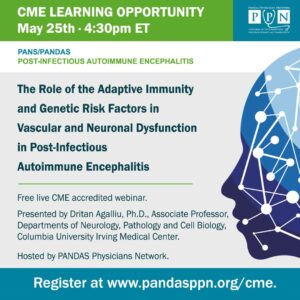The Role of the Adaptive Immunity and Genetic Risk Factors in Vascular and Neuronal Dysfunction in Post-Infectious Autoimmune Encephalitis
Available on Demand
Presented by Dritan Agalliu, Ph.D.
Associate Professor, Departments of Neurology, Pathology and Cell Biology, Columbia University Irving Medical Center
 Learning Objectives
Learning Objectives
Participants will be able to:
- Evaluate the causes of Autoimmune Encephalitis, Post-Infectious Autoimmune Encephalitis and the immune mechanisms that induce the disease.
- Determine how Th17 lymphocytes induce blood-brain barrier damage, neuroinflammation and cause neuronal impairment in animal models for post-infectious basal ganglia encephalitis.
- Review the cytokines that are present in sera from PANDAS/PANS patients and their effect on the blood-brain barrier in vitro.
- Consider the genetic risk factors identified in PANDAS/PANS that predispose the children to develop the disease and incorporate a team-based approach to counsel and guide patients and families diagnosed with PANDAS/PANS.
Physicians
Projects In Knowledge® is accredited by the Accreditation Council for Continuing Medical Education(ACCME) to provide continuing medical education for physicians.
Projects In Knowledge® designates this enduring material for a maximum of 1.0 AMA PRA Category 1 Credit(s)™. Physicians should claim only the credit commensurate with the extent of their participation in the activity.
Nurses
Projects In Knowledge®(PIK)is accredited as a provider of continuing nursing education by the American Nurses Credentialing Center’s Commission on Accreditation.
Upon completion of this course, participants will be awarded 1.0 nursing contact hour(s).
DISCLAIMER: Accreditation refers to educational content only and does not imply ANCC, or PIK endorsement of any commercial product or service.